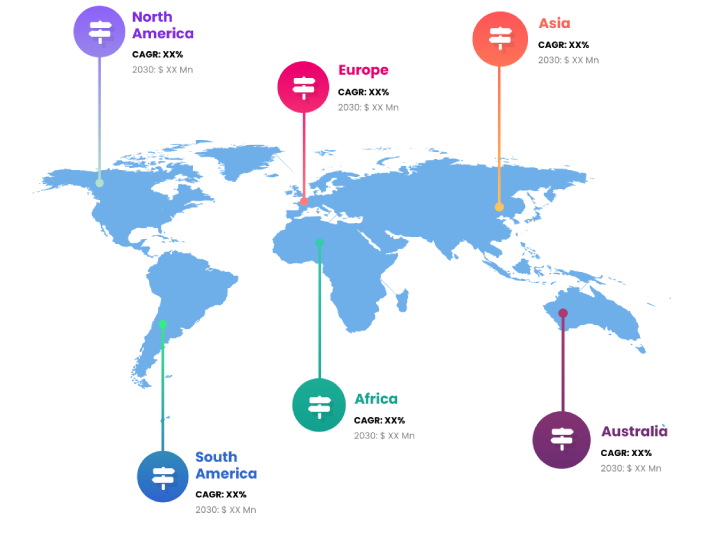The leading companies in the luxury electric car market are heavily investing in the development of high-density, lightweight batteries. For instance, in an effort to reduce the price of electric batteries, General Motors Company is researching various propulsion chemistries in combination. In order to lower the cost of propulsion cells to $100/kwh by the year 2025, General Motors is experimenting with the production of its next-generation Ultium batteries using a lithium metal anode and a silicon-rich anode. The business also intends to extend the battery life of high-speed electric vehicles, which have a driving range of 805 to 965 kilometres.
The market for luxury electric vehicles is expanding as a result of government measures to boost the adoption of electric vehicles in emerging countries. Many governments are offering tax breaks for buying luxury and affordable electric cars, which is motivating people to choose electric models over gasoline-powered ones. Additionally, the decision to buy an automobile is influenced by changes in crude oil prices brought on by pandemics, geopolitical events, harsh weather, and an increase in the already existent fluctuations. Customers are moving towards technologically advanced, secure, and luxurious electric automobiles as a result of the rise in gasoline prices, which raises the overall cost of owning a vehicle over the course of the vehicle's lifespan.
The lack of global charging infrastructure, including charging stations, charging points, and supporting infrastructure, further hinders the sales of premium electric vehicles. By 2021, for example, Mexico and other emerging countries will have about 1,069 propulsive charging stations, of which 1002 are public charging stations and 67 are fast charging stations. As a result, Mexico's lack of rapid charging infrastructure hinders the selling of luxury electric vehicles there.

Report Coverage
Global Luxury Electric Vehicles research report categorizes the market for global based on various segments and regions, forecasts revenue growth, and analyzes trends in each submarket. Global Luxury Electric Vehicles report analyses the key growth drivers, opportunities, and challenges influencing the global market. Recent market developments and Luxury Electric Vehicles competitive strategies such as expansion, product launch and development, partnership, merger, and acquisition have been included to draw the competitive landscape in the market. The report strategically identifies and profiles the key Luxury Electric Vehicles market players and analyses their core competencies in each global market sub-segments.
| REPORT ATTRIBUTES | DETAILS |
|---|---|
| Study Period | 2017-2030 |
| Base Year | 2020 |
| Forecast Period | 2022-2030 |
| Historical Period | 2017-2019 |
| Unit | Value (USD Billion) |
| Key Companies Profiled | Tesla, Inc.; BYD Auto Co., Ltd.; Volkswagen AG; BMW AG; AB Volvo; Ford Motor Company; Hyundai Motor Company; Toyota Motor Corporation; Kia Corporation; Audi AG. |
| Segments Covered | • By Product |
| Customization Scope | Free report customization (equivalent to up to 3 analyst working days) with purchase. Addition or alteration to country, regional & segment scope |
Key Points Covered in the Report
- Market Revenue of Luxury Electric Vehicles Market from 2021 to 2030.
- Market Forecast for Luxury Electric Vehicles Market from 2021 to 2030.
- Regional Market Share and Revenue from 2021 to 2030.
- Country Market share within region from 2021 to 2030.
- Key Type and Application Revenue and forecast.
- Company Market Share Analysis, Luxury Electric Vehicles competitive scenario, ranking, and detailed company
profiles. - Market driver, restraints, and detailed COVID-19 impact on Luxury Electric Vehicles
Market
Competitive Environment:
The research provides an accurate study of the major organisations and companies operating in the global Luxury Electric Vehicles market, along with a comparative evaluation based on their product portfolios, corporate summaries, geographic reach, business plans, Luxury Electric Vehicles market shares in specific segments, and SWOT analyses. A detailed analysis of the firms' recent news and developments, such as product development, inventions, joint ventures, partnerships, mergers and acquisitions, strategic alliances, and other activities, is also included in the study. This makes it possible to assess the level of market competition as a whole.
List of Major Market Participants
Tesla, Inc.; BYD Auto Co., Ltd.; Volkswagen AG; BMW AG; AB Volvo; Ford Motor Company; Hyundai Motor Company; Toyota Motor Corporation; Kia Corporation; Audi AG.
Primary Target Market
- Market Players of Luxury Electric Vehicles
- Investors
- End-users
- Government Authorities
- Consulting And Research Firm
- Venture capitalists
- Third-party knowledge providers
- Value-Added Resellers (VARs)
Market Segment:
This study forecasts global, regional, and country revenue from 2019 to 2030. Spherical Insights has segmented the global Luxury Electric Vehicles market based on the below-mentioned segments:
Global Luxury Electric Vehicles Market, By Propulsion Type
BEV
PHEV
FCEV
Global Luxury Electric Vehicles market, By Vehicle Type
Cars
Buses
Vans
Trucks
Global Luxury Electric Vehicles market, Regional Analysis
- Europe: Germany, Uk, France, Italy, Spain, Russia, Rest of Europe
- The Asia Pacific: China,Japan,India,South Korea,Australia,Rest of Asia Pacific
- South America: Brazil, Argentina, Rest of South America
- Middle East & Africa: UAE, Saudi Arabia, Qatar, South Africa, Rest of Middle East & Africa
You will get in-depth and extensive luxury electric vehicles market market research and competitor analysis for your business to help you develop more profound insights into the luxury electric vehicles market Market.
Through INFINITIVE Data Expert is a professional Market Research services, I will identify the luxury electric vehicles market market size, demand & opportunities, growth rate, and target audience with a comprehensive analysis of your competitors.



